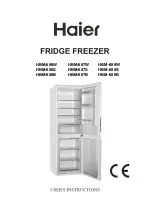
8.
CARE AND CLEANING
CAUTION!
Unplug the appliance before car-
rying out any maintenance opera-
tion.
This appliance contains hydrocar-
bons in its cooling unit; mainte-
nance and recharging must there-
fore only be carried out by author-
ized technicians.
8.1
Periodic cleaning
1.
Switch off the appliance.
2.
Disconnect the mains plug from the
mains socket.
3.
Regularly clean the appliance and the
accessories with warm water and
neutral soap. Clean the lid seal care-
fully.
4.
Fully dry the appliance.
5.
Connect the mains plug to the mains
socket.
6.
Switch on the appliance.
CAUTION!
Do not use detergents, abrasive
products, highly perfumed clean-
ing products or wax polishes to
clean the inner side of the appli-
ance.
Prevent damage to the cooling
system.
There is no need to clean the
compressor area.
Many proprietary kitchen surface cleaners
contain chemicals that can attack/dam-
age the plastics used in this appliance.
For this reason it is recommended that
the outer casing of this appliance is only
cleaned with warm water with a little
washing-up liquid added.
8.2
Defrosting the freezer
Defrost the freezer when the frost layer
reaches a thickness of about 10-15 mm.
The best time to defrost the freezer when
it contains no or only a little food.
To remove the frost, do these steps:
1.
Switch off the appliance.
2.
Remove any stored food, wrap it in
several layers of newspaper and put it
in a cool place.
3.
Leave the lid open , remove the plug
from the defrost water drain and col-
lect all defrost water on a tray. Use a
scraper to remove ice quickly.
4.
When defrosting is completed, dry
the interior thoroughly and refit the
plug.
5.
Switch on the appliance.
6.
Set the temperature regulator to ob-
tain the maximum coldness and run
the appliance for two or three hours
using this setting.
7.
Reload the previously removed food
into the compartment.
Never use sharp metal tools to
scrape off frost as you could dam-
age the appliance. Do not use a
mechanical device or any artificial
means to speed up the thawing
process other than those recom-
mended by the manufacturer. A
temperature rise of the frozen
food packs, during defrosting,
may shorten their safe storage life.
The amount of frost on the walls
of the appliance will be increased
by the high level of the outer envi-
ronment humidity and if the frozen
food is not wrapped properly.
8.3
Periods of non-operation
When the appliance is not in use for long
periods, take the following precautions:
1.
Switch off the appliance.
2.
Disconnect the mains plug from the
mains socket.
3.
Remove all food.
4.
Defrost and clean the appliance and
all accessories.
5.
Leave the lid open to prevent un-
pleasant smells.
If the cabinet will be kept on, ask
somebody to check it once in a
while to prevent the food inside
from spoiling in case of a power
failure.
ENGLISH
9
Summary of Contents for EC2200AEW
Page 1: ...EC2200AEW EN CHEST FREEZER USER MANUAL ...
Page 17: ...ENGLISH 17 ...
Page 18: ...18 www electrolux com ...
Page 19: ...ENGLISH 19 ...






































